Artificial Intelligence Roadmap for AI Implementation in Cardiology
VerifiedAdded on 2023/04/28
|12
|2262
|495
Project
AI Summary
This project provides an executive summary on the growing burden of cardiovascular disease and the potential of Artificial Intelligence (AI) to revolutionize cardiology. It explores the implementation of AI, including machine learning and deep learning, across various aspects of cardiology, such as image recognition (MRI, echocardiography, CT scans, and nuclear imaging), and its impact on medical practices. The project analyzes how AI can improve efficiency, increase revenue through automation, and decrease costs. It also discusses the challenges of AI implementation, including the need for education, quality control, and data accessibility, and proposes solutions to mediate potential issues. The project emphasizes the benefits of AI in automating tasks, analyzing medical data, and providing better healthcare, highlighting the AI revolution in cardiology and the development of AI techniques for accurate outcome prediction, non-invasive diagnosis, and treatment options for patients with heart failure. Finally, the project lists all the resources used to create this paper.
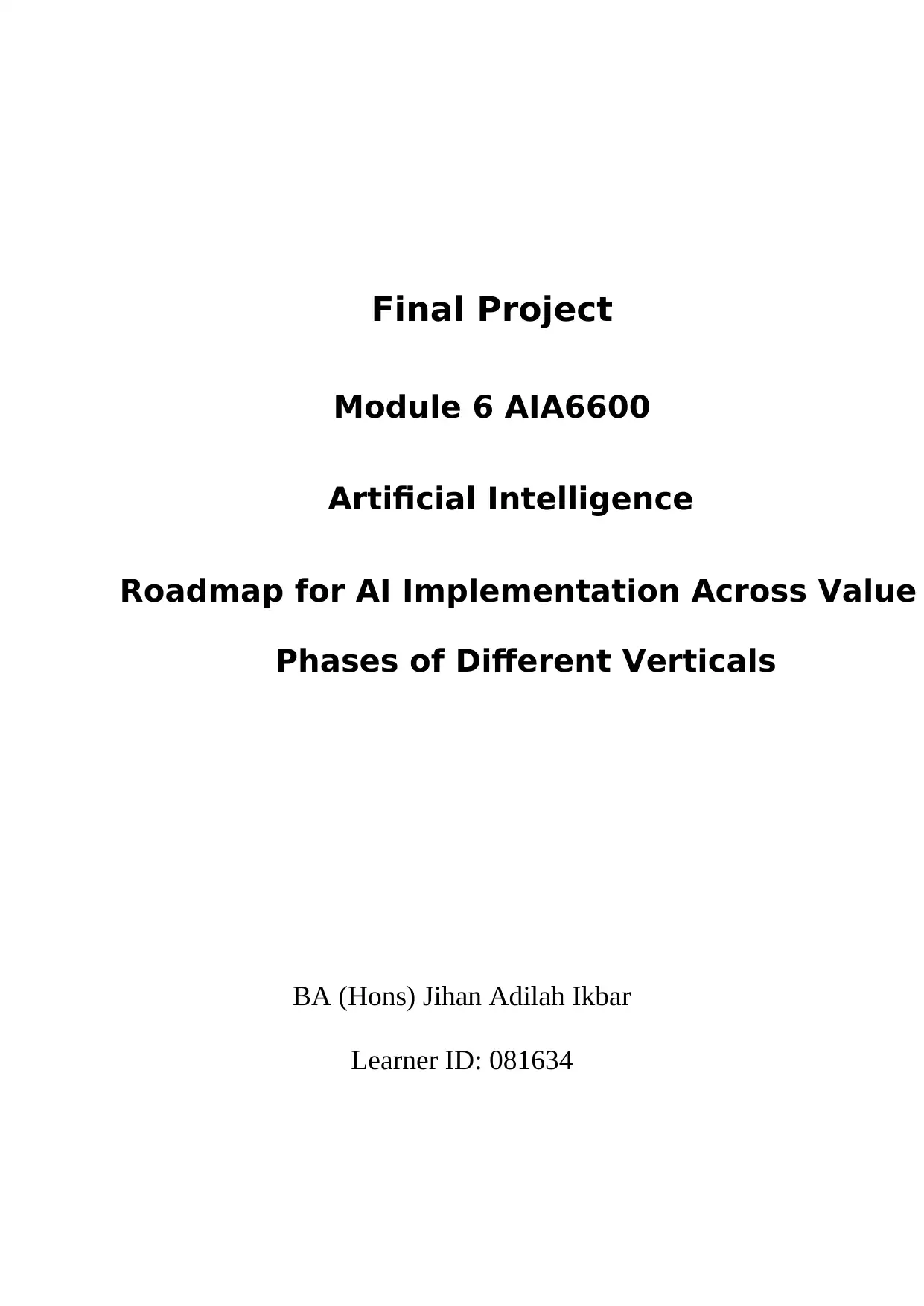
Final Project
Module 6 AIA6600
Artificial Intelligence
Roadmap for AI Implementation Across Value
Phases of Different Verticals
BA (Hons) Jihan Adilah Ikbar
Learner ID: 081634
Module 6 AIA6600
Artificial Intelligence
Roadmap for AI Implementation Across Value
Phases of Different Verticals
BA (Hons) Jihan Adilah Ikbar
Learner ID: 081634
Paraphrase This Document
Need a fresh take? Get an instant paraphrase of this document with our AI Paraphraser
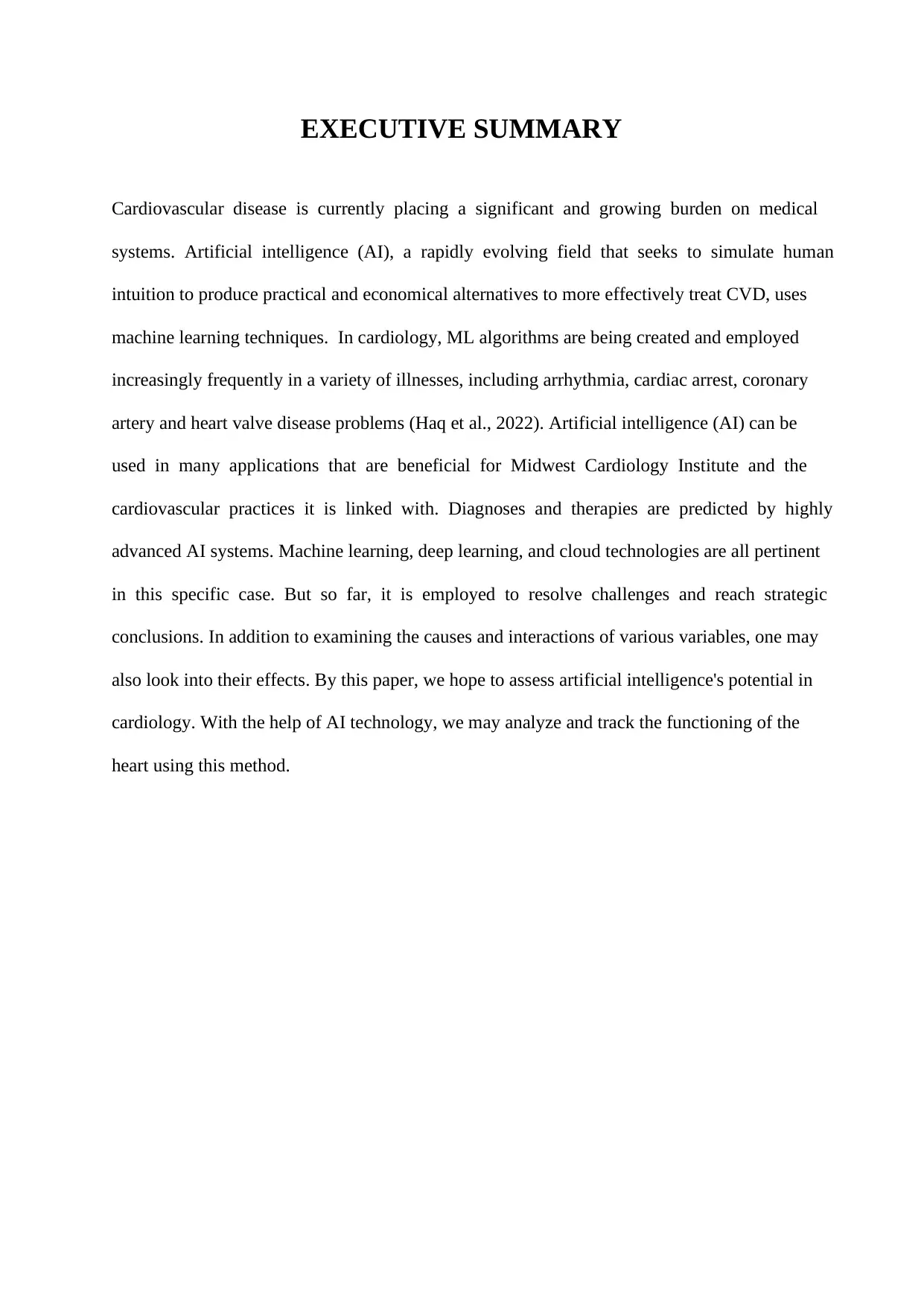
EXECUTIVE SUMMARY
Cardiovascular disease is currently placing a significant and growing burden on medical
systems. Artificial intelligence (AI), a rapidly evolving field that seeks to simulate human
intuition to produce practical and economical alternatives to more effectively treat CVD, uses
machine learning techniques. In cardiology, ML algorithms are being created and employed
increasingly frequently in a variety of illnesses, including arrhythmia, cardiac arrest, coronary
artery and heart valve disease problems (Haq et al., 2022). Artificial intelligence (AI) can be
used in many applications that are beneficial for Midwest Cardiology Institute and the
cardiovascular practices it is linked with. Diagnoses and therapies are predicted by highly
advanced AI systems. Machine learning, deep learning, and cloud technologies are all pertinent
in this specific case. But so far, it is employed to resolve challenges and reach strategic
conclusions. In addition to examining the causes and interactions of various variables, one may
also look into their effects. By this paper, we hope to assess artificial intelligence's potential in
cardiology. With the help of AI technology, we may analyze and track the functioning of the
heart using this method.
Cardiovascular disease is currently placing a significant and growing burden on medical
systems. Artificial intelligence (AI), a rapidly evolving field that seeks to simulate human
intuition to produce practical and economical alternatives to more effectively treat CVD, uses
machine learning techniques. In cardiology, ML algorithms are being created and employed
increasingly frequently in a variety of illnesses, including arrhythmia, cardiac arrest, coronary
artery and heart valve disease problems (Haq et al., 2022). Artificial intelligence (AI) can be
used in many applications that are beneficial for Midwest Cardiology Institute and the
cardiovascular practices it is linked with. Diagnoses and therapies are predicted by highly
advanced AI systems. Machine learning, deep learning, and cloud technologies are all pertinent
in this specific case. But so far, it is employed to resolve challenges and reach strategic
conclusions. In addition to examining the causes and interactions of various variables, one may
also look into their effects. By this paper, we hope to assess artificial intelligence's potential in
cardiology. With the help of AI technology, we may analyze and track the functioning of the
heart using this method.
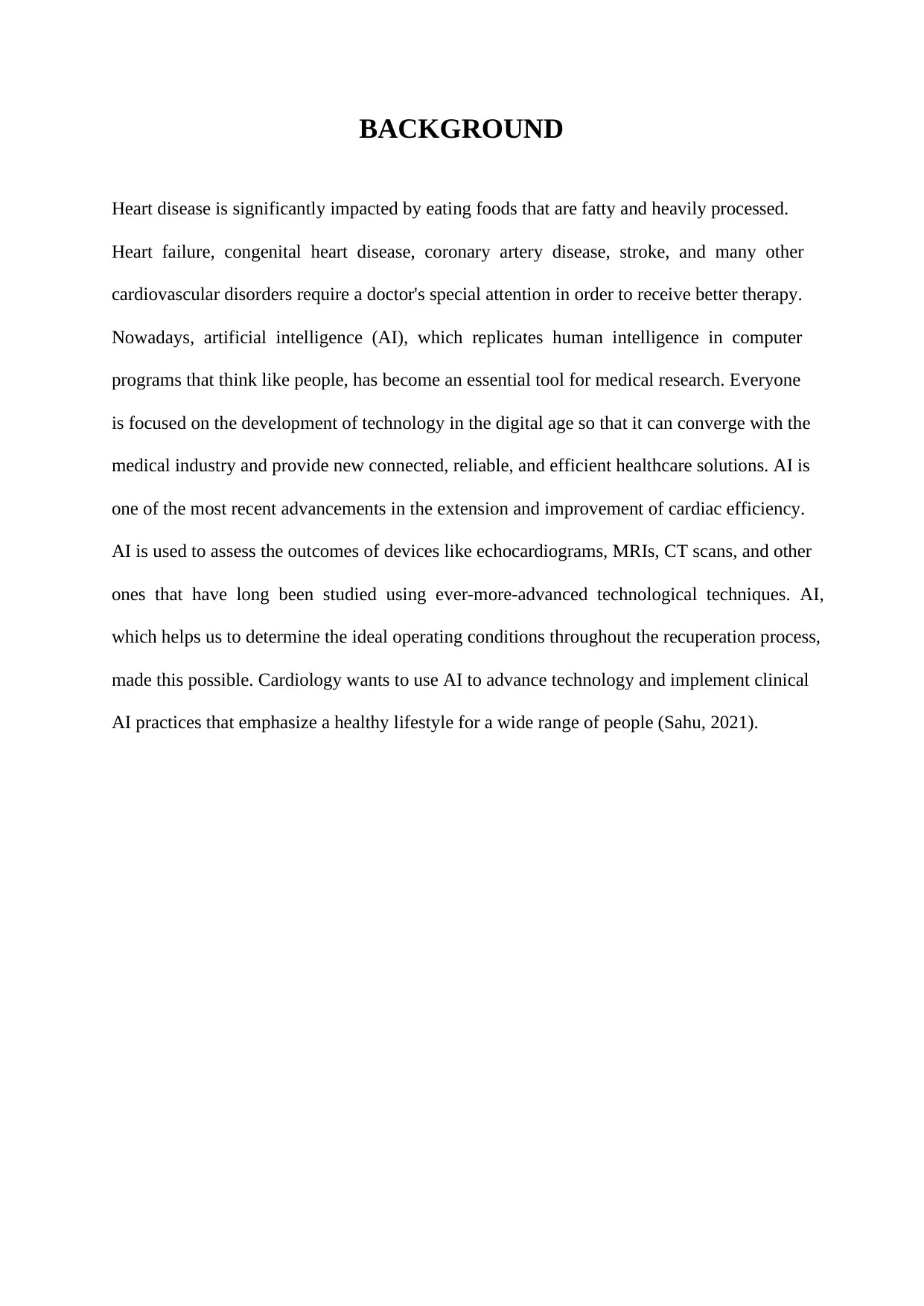
BACKGROUND
Heart disease is significantly impacted by eating foods that are fatty and heavily processed.
Heart failure, congenital heart disease, coronary artery disease, stroke, and many other
cardiovascular disorders require a doctor's special attention in order to receive better therapy.
Nowadays, artificial intelligence (AI), which replicates human intelligence in computer
programs that think like people, has become an essential tool for medical research. Everyone
is focused on the development of technology in the digital age so that it can converge with the
medical industry and provide new connected, reliable, and efficient healthcare solutions. AI is
one of the most recent advancements in the extension and improvement of cardiac efficiency.
AI is used to assess the outcomes of devices like echocardiograms, MRIs, CT scans, and other
ones that have long been studied using ever-more-advanced technological techniques. AI,
which helps us to determine the ideal operating conditions throughout the recuperation process,
made this possible. Cardiology wants to use AI to advance technology and implement clinical
AI practices that emphasize a healthy lifestyle for a wide range of people (Sahu, 2021).
Heart disease is significantly impacted by eating foods that are fatty and heavily processed.
Heart failure, congenital heart disease, coronary artery disease, stroke, and many other
cardiovascular disorders require a doctor's special attention in order to receive better therapy.
Nowadays, artificial intelligence (AI), which replicates human intelligence in computer
programs that think like people, has become an essential tool for medical research. Everyone
is focused on the development of technology in the digital age so that it can converge with the
medical industry and provide new connected, reliable, and efficient healthcare solutions. AI is
one of the most recent advancements in the extension and improvement of cardiac efficiency.
AI is used to assess the outcomes of devices like echocardiograms, MRIs, CT scans, and other
ones that have long been studied using ever-more-advanced technological techniques. AI,
which helps us to determine the ideal operating conditions throughout the recuperation process,
made this possible. Cardiology wants to use AI to advance technology and implement clinical
AI practices that emphasize a healthy lifestyle for a wide range of people (Sahu, 2021).
⊘ This is a preview!⊘
Do you want full access?
Subscribe today to unlock all pages.

Trusted by 1+ million students worldwide
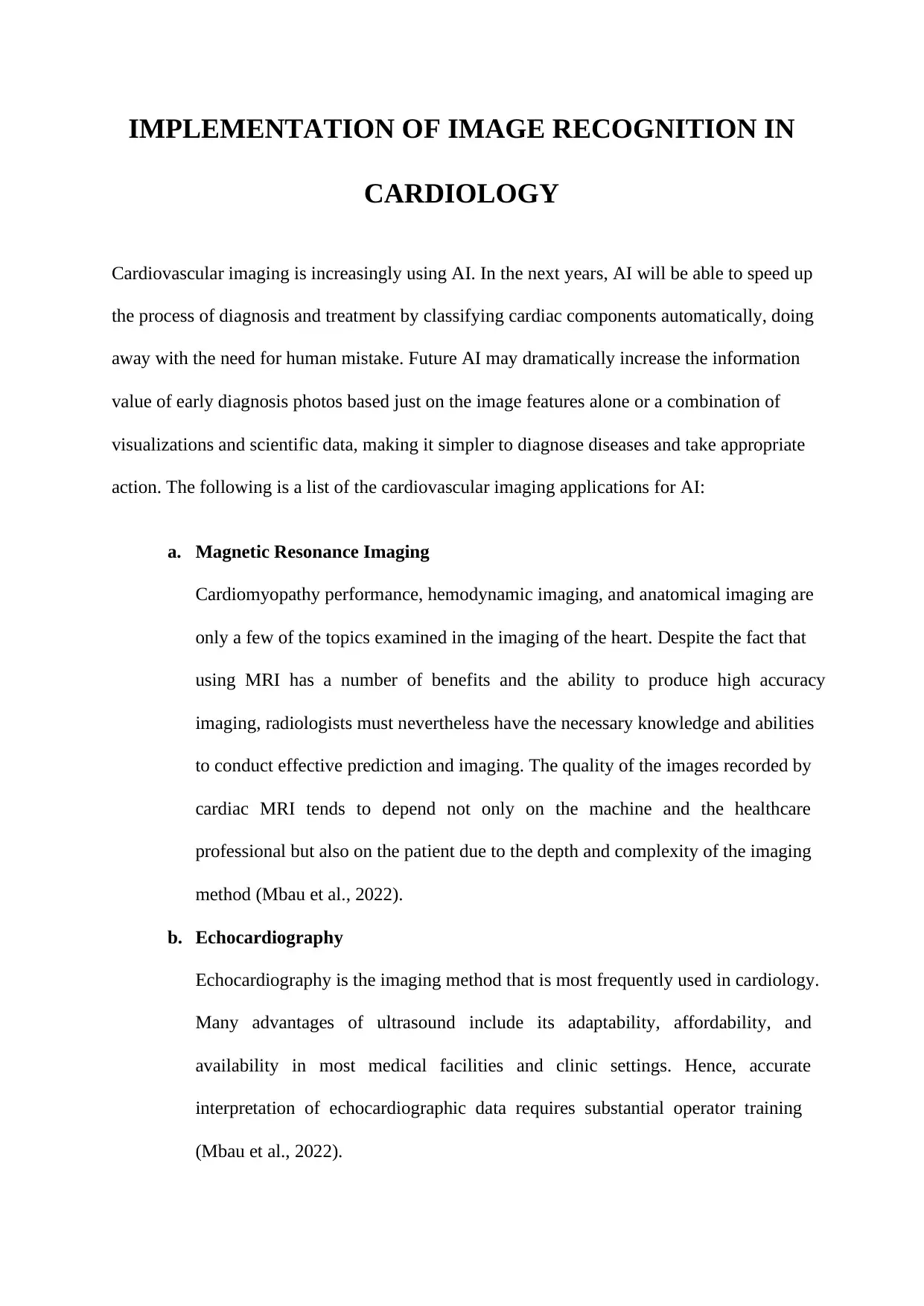
IMPLEMENTATION OF IMAGE RECOGNITION IN
CARDIOLOGY
Cardiovascular imaging is increasingly using AI. In the next years, AI will be able to speed up
the process of diagnosis and treatment by classifying cardiac components automatically, doing
away with the need for human mistake. Future AI may dramatically increase the information
value of early diagnosis photos based just on the image features alone or a combination of
visualizations and scientific data, making it simpler to diagnose diseases and take appropriate
action. The following is a list of the cardiovascular imaging applications for AI:
a. Magnetic Resonance Imaging
Cardiomyopathy performance, hemodynamic imaging, and anatomical imaging are
only a few of the topics examined in the imaging of the heart. Despite the fact that
using MRI has a number of benefits and the ability to produce high accuracy
imaging, radiologists must nevertheless have the necessary knowledge and abilities
to conduct effective prediction and imaging. The quality of the images recorded by
cardiac MRI tends to depend not only on the machine and the healthcare
professional but also on the patient due to the depth and complexity of the imaging
method (Mbau et al., 2022).
b. Echocardiography
Echocardiography is the imaging method that is most frequently used in cardiology.
Many advantages of ultrasound include its adaptability, affordability, and
availability in most medical facilities and clinic settings. Hence, accurate
interpretation of echocardiographic data requires substantial operator training
(Mbau et al., 2022).
CARDIOLOGY
Cardiovascular imaging is increasingly using AI. In the next years, AI will be able to speed up
the process of diagnosis and treatment by classifying cardiac components automatically, doing
away with the need for human mistake. Future AI may dramatically increase the information
value of early diagnosis photos based just on the image features alone or a combination of
visualizations and scientific data, making it simpler to diagnose diseases and take appropriate
action. The following is a list of the cardiovascular imaging applications for AI:
a. Magnetic Resonance Imaging
Cardiomyopathy performance, hemodynamic imaging, and anatomical imaging are
only a few of the topics examined in the imaging of the heart. Despite the fact that
using MRI has a number of benefits and the ability to produce high accuracy
imaging, radiologists must nevertheless have the necessary knowledge and abilities
to conduct effective prediction and imaging. The quality of the images recorded by
cardiac MRI tends to depend not only on the machine and the healthcare
professional but also on the patient due to the depth and complexity of the imaging
method (Mbau et al., 2022).
b. Echocardiography
Echocardiography is the imaging method that is most frequently used in cardiology.
Many advantages of ultrasound include its adaptability, affordability, and
availability in most medical facilities and clinic settings. Hence, accurate
interpretation of echocardiographic data requires substantial operator training
(Mbau et al., 2022).
Paraphrase This Document
Need a fresh take? Get an instant paraphrase of this document with our AI Paraphraser
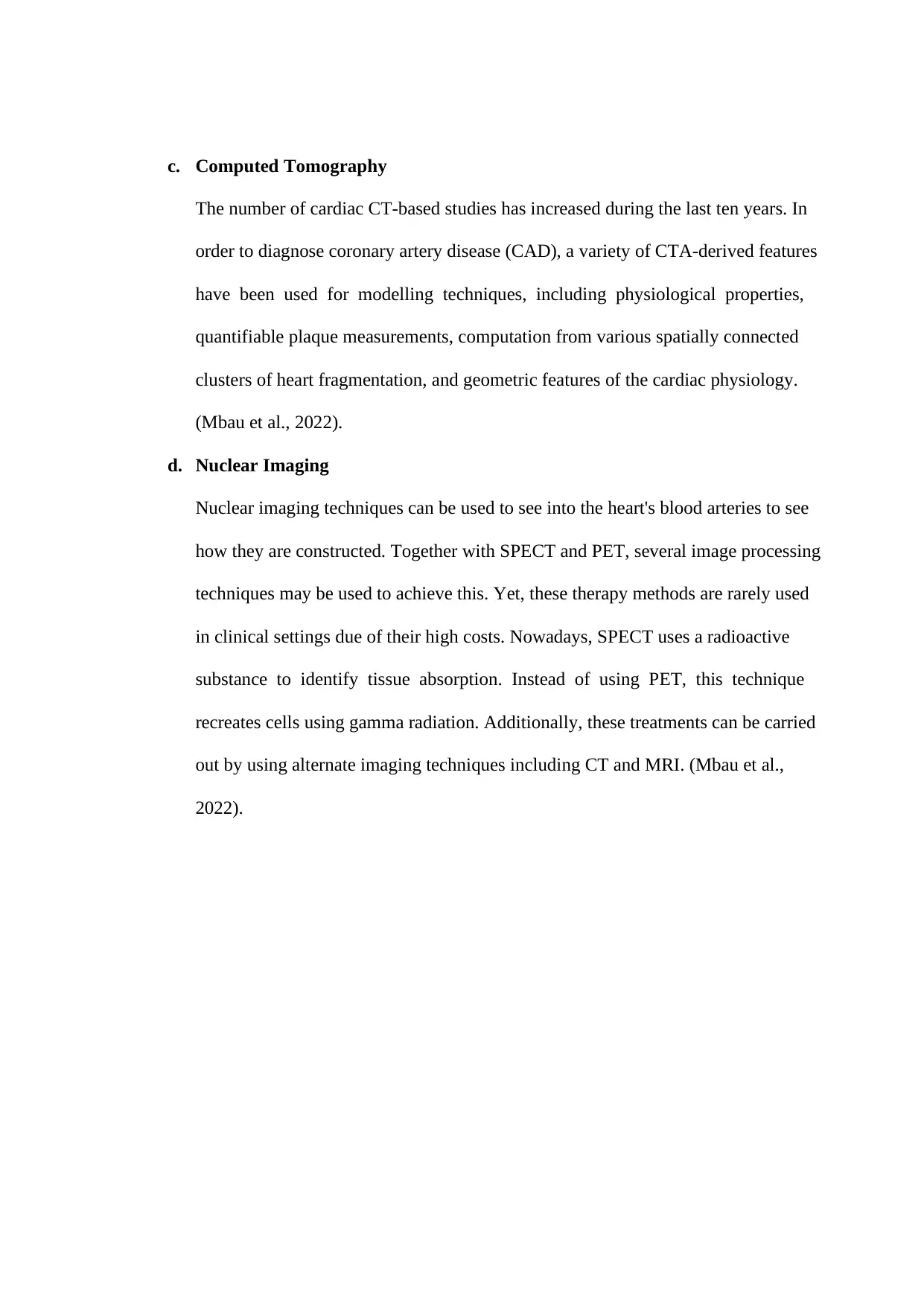
c. Computed Tomography
The number of cardiac CT-based studies has increased during the last ten years. In
order to diagnose coronary artery disease (CAD), a variety of CTA-derived features
have been used for modelling techniques, including physiological properties,
quantifiable plaque measurements, computation from various spatially connected
clusters of heart fragmentation, and geometric features of the cardiac physiology.
(Mbau et al., 2022).
d. Nuclear Imaging
Nuclear imaging techniques can be used to see into the heart's blood arteries to see
how they are constructed. Together with SPECT and PET, several image processing
techniques may be used to achieve this. Yet, these therapy methods are rarely used
in clinical settings due of their high costs. Nowadays, SPECT uses a radioactive
substance to identify tissue absorption. Instead of using PET, this technique
recreates cells using gamma radiation. Additionally, these treatments can be carried
out by using alternate imaging techniques including CT and MRI. (Mbau et al.,
2022).
The number of cardiac CT-based studies has increased during the last ten years. In
order to diagnose coronary artery disease (CAD), a variety of CTA-derived features
have been used for modelling techniques, including physiological properties,
quantifiable plaque measurements, computation from various spatially connected
clusters of heart fragmentation, and geometric features of the cardiac physiology.
(Mbau et al., 2022).
d. Nuclear Imaging
Nuclear imaging techniques can be used to see into the heart's blood arteries to see
how they are constructed. Together with SPECT and PET, several image processing
techniques may be used to achieve this. Yet, these therapy methods are rarely used
in clinical settings due of their high costs. Nowadays, SPECT uses a radioactive
substance to identify tissue absorption. Instead of using PET, this technique
recreates cells using gamma radiation. Additionally, these treatments can be carried
out by using alternate imaging techniques including CT and MRI. (Mbau et al.,
2022).
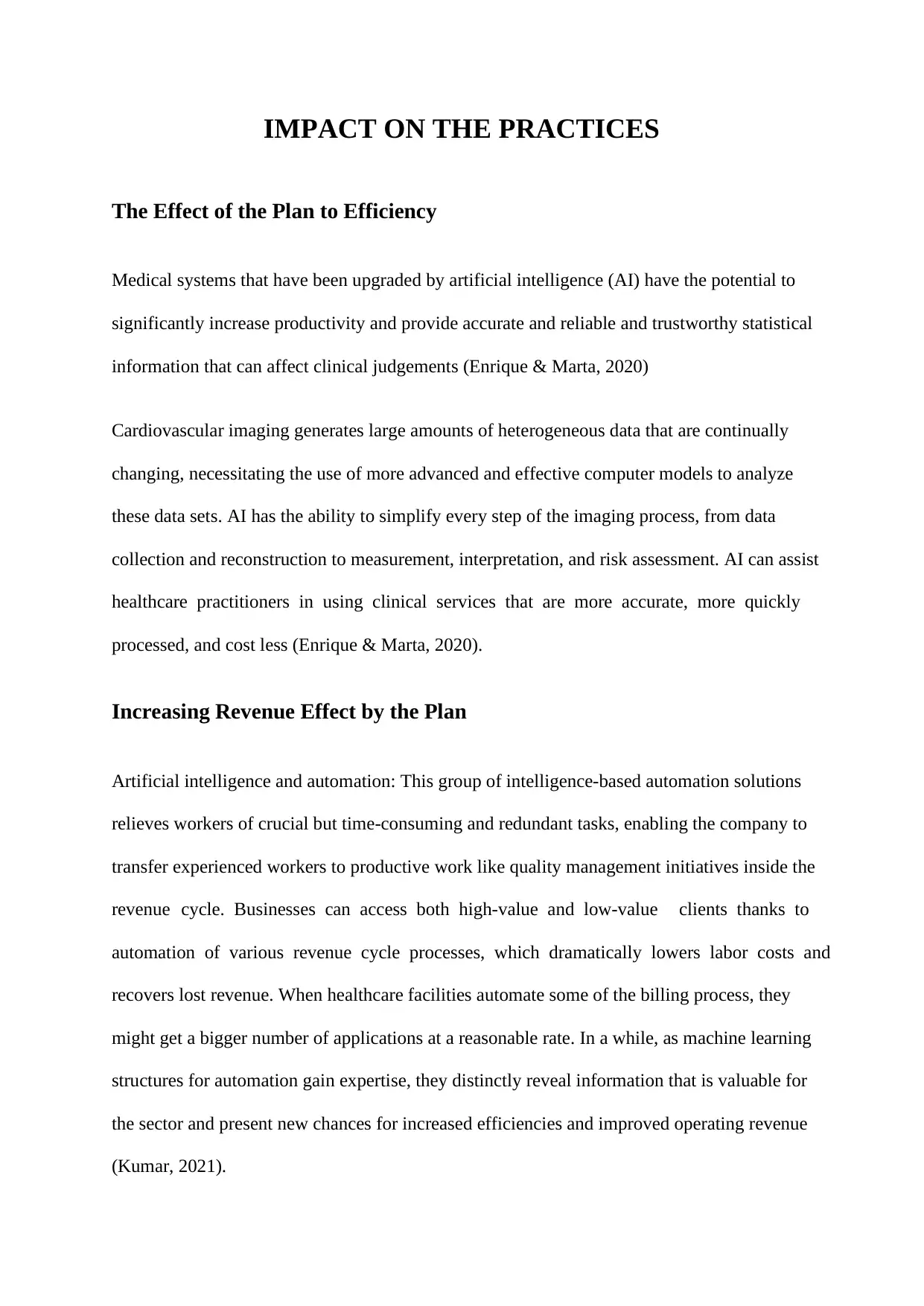
IMPACT ON THE PRACTICES
The Effect of the Plan to Efficiency
Medical systems that have been upgraded by artificial intelligence (AI) have the potential to
significantly increase productivity and provide accurate and reliable and trustworthy statistical
information that can affect clinical judgements (Enrique & Marta, 2020)
Cardiovascular imaging generates large amounts of heterogeneous data that are continually
changing, necessitating the use of more advanced and effective computer models to analyze
these data sets. AI has the ability to simplify every step of the imaging process, from data
collection and reconstruction to measurement, interpretation, and risk assessment. AI can assist
healthcare practitioners in using clinical services that are more accurate, more quickly
processed, and cost less (Enrique & Marta, 2020).
Increasing Revenue Effect by the Plan
Artificial intelligence and automation: This group of intelligence-based automation solutions
relieves workers of crucial but time-consuming and redundant tasks, enabling the company to
transfer experienced workers to productive work like quality management initiatives inside the
revenue cycle. Businesses can access both high-value and low-value clients thanks to
automation of various revenue cycle processes, which dramatically lowers labor costs and
recovers lost revenue. When healthcare facilities automate some of the billing process, they
might get a bigger number of applications at a reasonable rate. In a while, as machine learning
structures for automation gain expertise, they distinctly reveal information that is valuable for
the sector and present new chances for increased efficiencies and improved operating revenue
(Kumar, 2021).
The Effect of the Plan to Efficiency
Medical systems that have been upgraded by artificial intelligence (AI) have the potential to
significantly increase productivity and provide accurate and reliable and trustworthy statistical
information that can affect clinical judgements (Enrique & Marta, 2020)
Cardiovascular imaging generates large amounts of heterogeneous data that are continually
changing, necessitating the use of more advanced and effective computer models to analyze
these data sets. AI has the ability to simplify every step of the imaging process, from data
collection and reconstruction to measurement, interpretation, and risk assessment. AI can assist
healthcare practitioners in using clinical services that are more accurate, more quickly
processed, and cost less (Enrique & Marta, 2020).
Increasing Revenue Effect by the Plan
Artificial intelligence and automation: This group of intelligence-based automation solutions
relieves workers of crucial but time-consuming and redundant tasks, enabling the company to
transfer experienced workers to productive work like quality management initiatives inside the
revenue cycle. Businesses can access both high-value and low-value clients thanks to
automation of various revenue cycle processes, which dramatically lowers labor costs and
recovers lost revenue. When healthcare facilities automate some of the billing process, they
might get a bigger number of applications at a reasonable rate. In a while, as machine learning
structures for automation gain expertise, they distinctly reveal information that is valuable for
the sector and present new chances for increased efficiencies and improved operating revenue
(Kumar, 2021).
⊘ This is a preview!⊘
Do you want full access?
Subscribe today to unlock all pages.

Trusted by 1+ million students worldwide
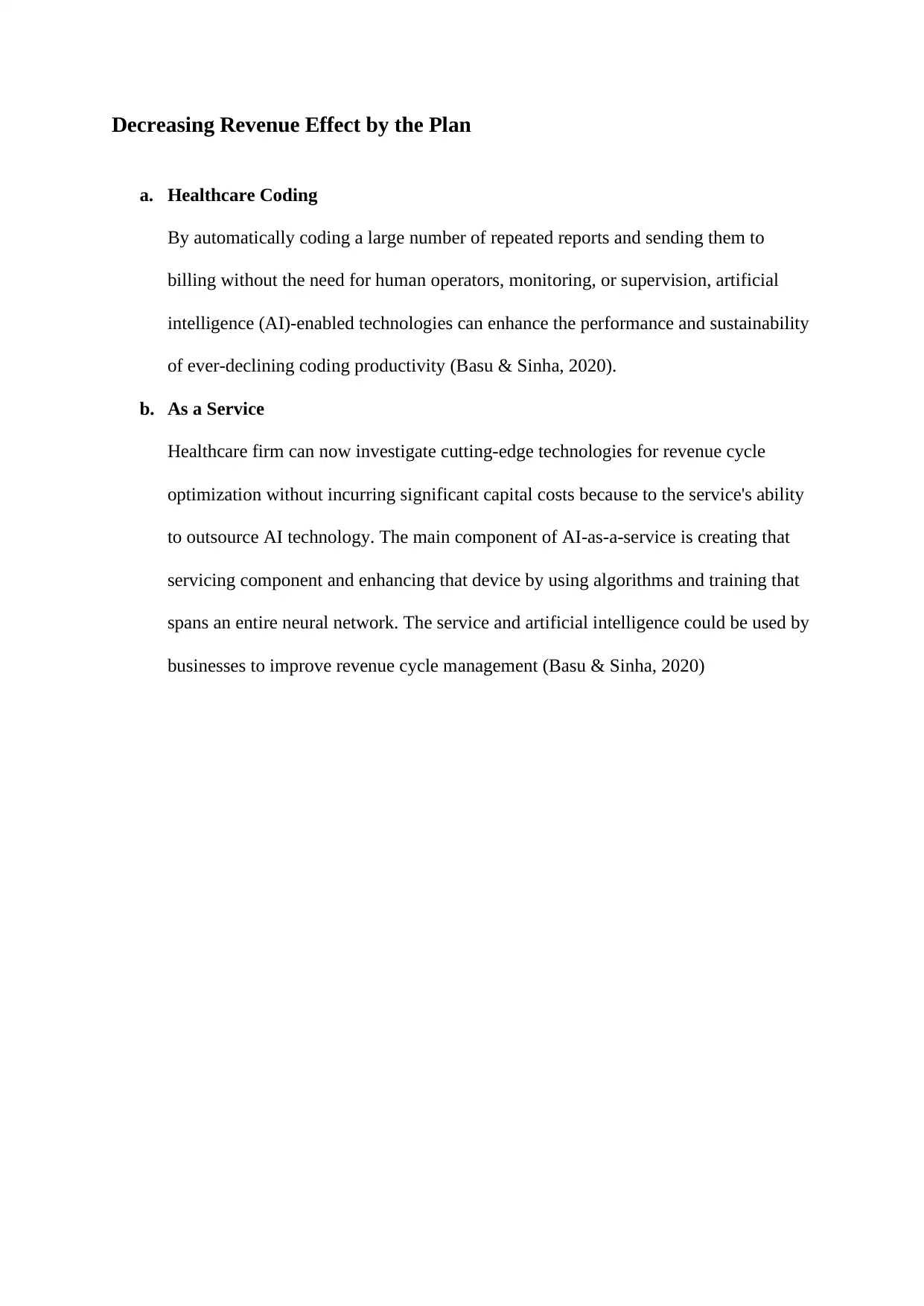
Decreasing Revenue Effect by the Plan
a. Healthcare Coding
By automatically coding a large number of repeated reports and sending them to
billing without the need for human operators, monitoring, or supervision, artificial
intelligence (AI)-enabled technologies can enhance the performance and sustainability
of ever-declining coding productivity (Basu & Sinha, 2020).
b. As a Service
Healthcare firm can now investigate cutting-edge technologies for revenue cycle
optimization without incurring significant capital costs because to the service's ability
to outsource AI technology. The main component of AI-as-a-service is creating that
servicing component and enhancing that device by using algorithms and training that
spans an entire neural network. The service and artificial intelligence could be used by
businesses to improve revenue cycle management (Basu & Sinha, 2020)
a. Healthcare Coding
By automatically coding a large number of repeated reports and sending them to
billing without the need for human operators, monitoring, or supervision, artificial
intelligence (AI)-enabled technologies can enhance the performance and sustainability
of ever-declining coding productivity (Basu & Sinha, 2020).
b. As a Service
Healthcare firm can now investigate cutting-edge technologies for revenue cycle
optimization without incurring significant capital costs because to the service's ability
to outsource AI technology. The main component of AI-as-a-service is creating that
servicing component and enhancing that device by using algorithms and training that
spans an entire neural network. The service and artificial intelligence could be used by
businesses to improve revenue cycle management (Basu & Sinha, 2020)
Paraphrase This Document
Need a fresh take? Get an instant paraphrase of this document with our AI Paraphraser
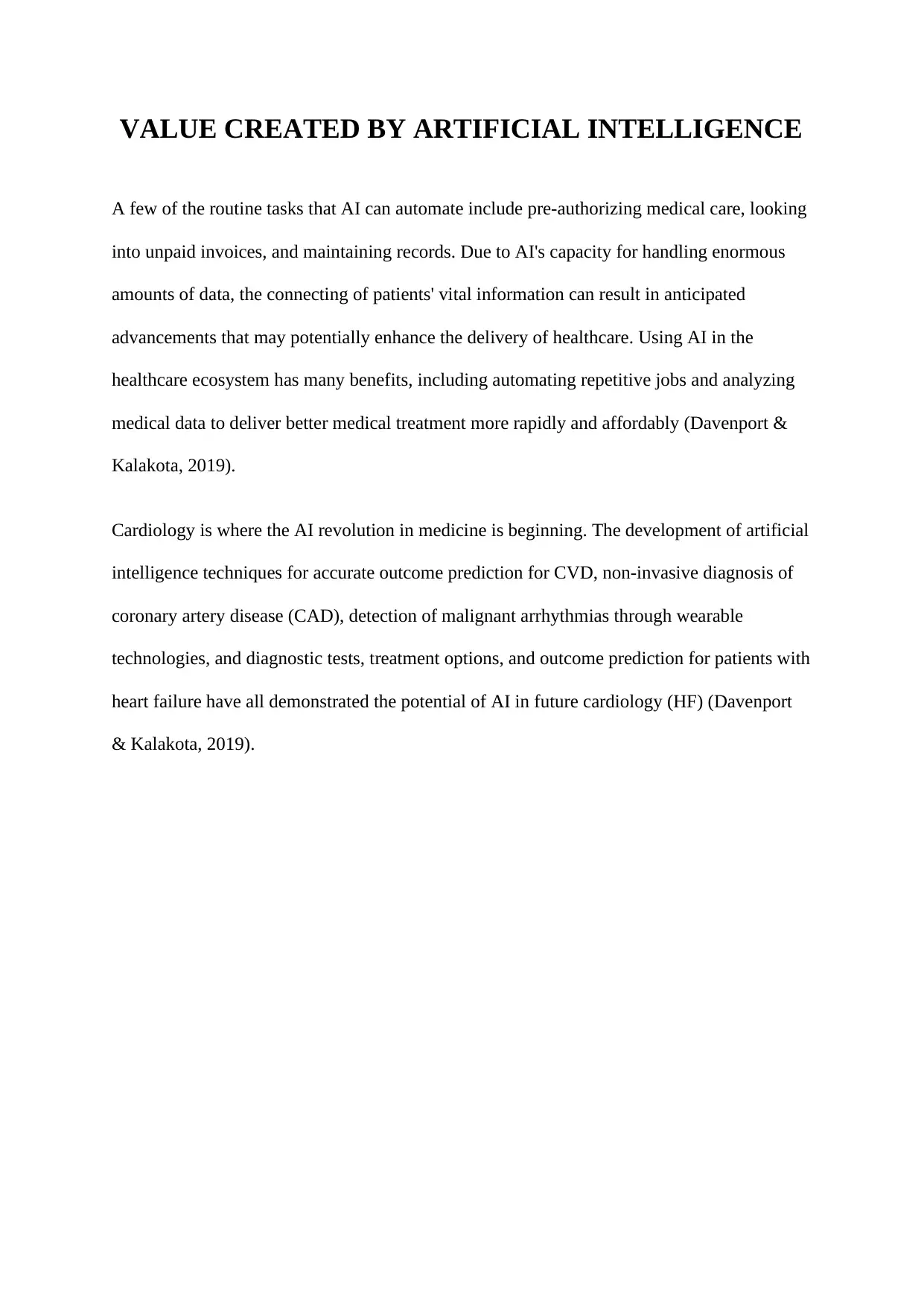
VALUE CREATED BY ARTIFICIAL INTELLIGENCE
A few of the routine tasks that AI can automate include pre-authorizing medical care, looking
into unpaid invoices, and maintaining records. Due to AI's capacity for handling enormous
amounts of data, the connecting of patients' vital information can result in anticipated
advancements that may potentially enhance the delivery of healthcare. Using AI in the
healthcare ecosystem has many benefits, including automating repetitive jobs and analyzing
medical data to deliver better medical treatment more rapidly and affordably (Davenport &
Kalakota, 2019).
Cardiology is where the AI revolution in medicine is beginning. The development of artificial
intelligence techniques for accurate outcome prediction for CVD, non-invasive diagnosis of
coronary artery disease (CAD), detection of malignant arrhythmias through wearable
technologies, and diagnostic tests, treatment options, and outcome prediction for patients with
heart failure have all demonstrated the potential of AI in future cardiology (HF) (Davenport
& Kalakota, 2019).
A few of the routine tasks that AI can automate include pre-authorizing medical care, looking
into unpaid invoices, and maintaining records. Due to AI's capacity for handling enormous
amounts of data, the connecting of patients' vital information can result in anticipated
advancements that may potentially enhance the delivery of healthcare. Using AI in the
healthcare ecosystem has many benefits, including automating repetitive jobs and analyzing
medical data to deliver better medical treatment more rapidly and affordably (Davenport &
Kalakota, 2019).
Cardiology is where the AI revolution in medicine is beginning. The development of artificial
intelligence techniques for accurate outcome prediction for CVD, non-invasive diagnosis of
coronary artery disease (CAD), detection of malignant arrhythmias through wearable
technologies, and diagnostic tests, treatment options, and outcome prediction for patients with
heart failure have all demonstrated the potential of AI in future cardiology (HF) (Davenport
& Kalakota, 2019).
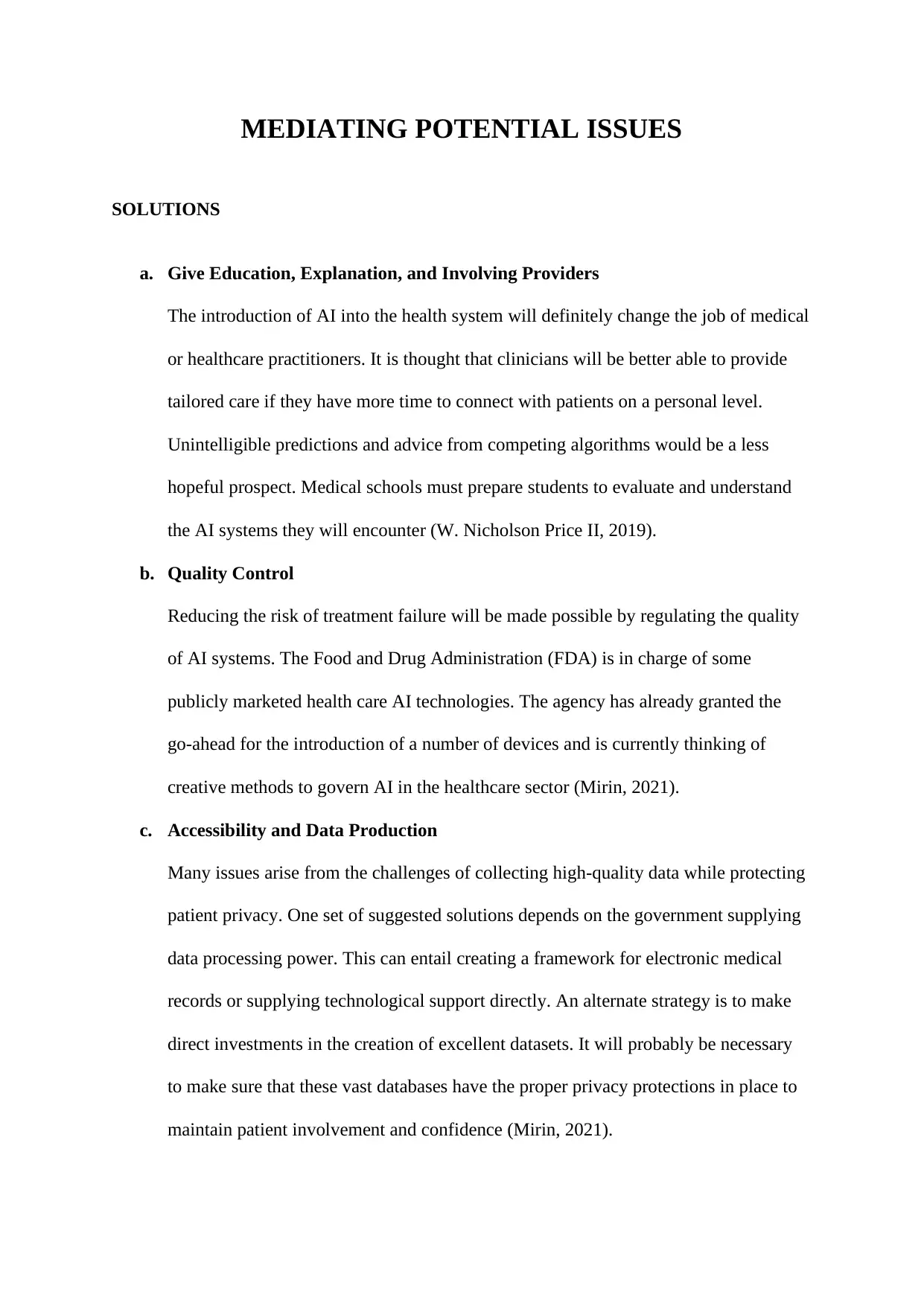
MEDIATING POTENTIAL ISSUES
SOLUTIONS
a. Give Education, Explanation, and Involving Providers
The introduction of AI into the health system will definitely change the job of medical
or healthcare practitioners. It is thought that clinicians will be better able to provide
tailored care if they have more time to connect with patients on a personal level.
Unintelligible predictions and advice from competing algorithms would be a less
hopeful prospect. Medical schools must prepare students to evaluate and understand
the AI systems they will encounter (W. Nicholson Price II, 2019).
b. Quality Control
Reducing the risk of treatment failure will be made possible by regulating the quality
of AI systems. The Food and Drug Administration (FDA) is in charge of some
publicly marketed health care AI technologies. The agency has already granted the
go-ahead for the introduction of a number of devices and is currently thinking of
creative methods to govern AI in the healthcare sector (Mirin, 2021).
c. Accessibility and Data Production
Many issues arise from the challenges of collecting high-quality data while protecting
patient privacy. One set of suggested solutions depends on the government supplying
data processing power. This can entail creating a framework for electronic medical
records or supplying technological support directly. An alternate strategy is to make
direct investments in the creation of excellent datasets. It will probably be necessary
to make sure that these vast databases have the proper privacy protections in place to
maintain patient involvement and confidence (Mirin, 2021).
SOLUTIONS
a. Give Education, Explanation, and Involving Providers
The introduction of AI into the health system will definitely change the job of medical
or healthcare practitioners. It is thought that clinicians will be better able to provide
tailored care if they have more time to connect with patients on a personal level.
Unintelligible predictions and advice from competing algorithms would be a less
hopeful prospect. Medical schools must prepare students to evaluate and understand
the AI systems they will encounter (W. Nicholson Price II, 2019).
b. Quality Control
Reducing the risk of treatment failure will be made possible by regulating the quality
of AI systems. The Food and Drug Administration (FDA) is in charge of some
publicly marketed health care AI technologies. The agency has already granted the
go-ahead for the introduction of a number of devices and is currently thinking of
creative methods to govern AI in the healthcare sector (Mirin, 2021).
c. Accessibility and Data Production
Many issues arise from the challenges of collecting high-quality data while protecting
patient privacy. One set of suggested solutions depends on the government supplying
data processing power. This can entail creating a framework for electronic medical
records or supplying technological support directly. An alternate strategy is to make
direct investments in the creation of excellent datasets. It will probably be necessary
to make sure that these vast databases have the proper privacy protections in place to
maintain patient involvement and confidence (Mirin, 2021).
⊘ This is a preview!⊘
Do you want full access?
Subscribe today to unlock all pages.

Trusted by 1+ million students worldwide
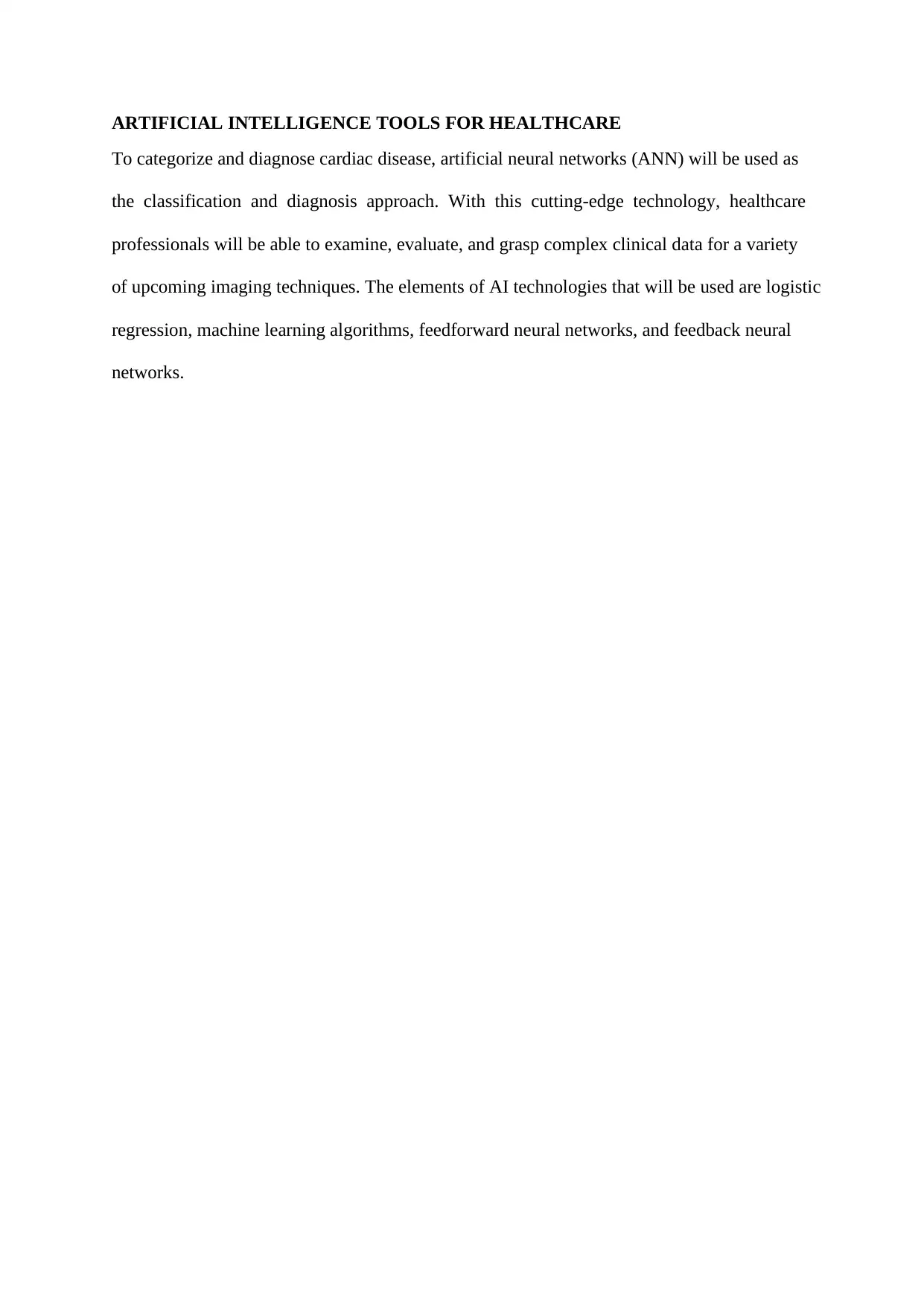
ARTIFICIAL INTELLIGENCE TOOLS FOR HEALTHCARE
To categorize and diagnose cardiac disease, artificial neural networks (ANN) will be used as
the classification and diagnosis approach. With this cutting-edge technology, healthcare
professionals will be able to examine, evaluate, and grasp complex clinical data for a variety
of upcoming imaging techniques. The elements of AI technologies that will be used are logistic
regression, machine learning algorithms, feedforward neural networks, and feedback neural
networks.
To categorize and diagnose cardiac disease, artificial neural networks (ANN) will be used as
the classification and diagnosis approach. With this cutting-edge technology, healthcare
professionals will be able to examine, evaluate, and grasp complex clinical data for a variety
of upcoming imaging techniques. The elements of AI technologies that will be used are logistic
regression, machine learning algorithms, feedforward neural networks, and feedback neural
networks.
Paraphrase This Document
Need a fresh take? Get an instant paraphrase of this document with our AI Paraphraser
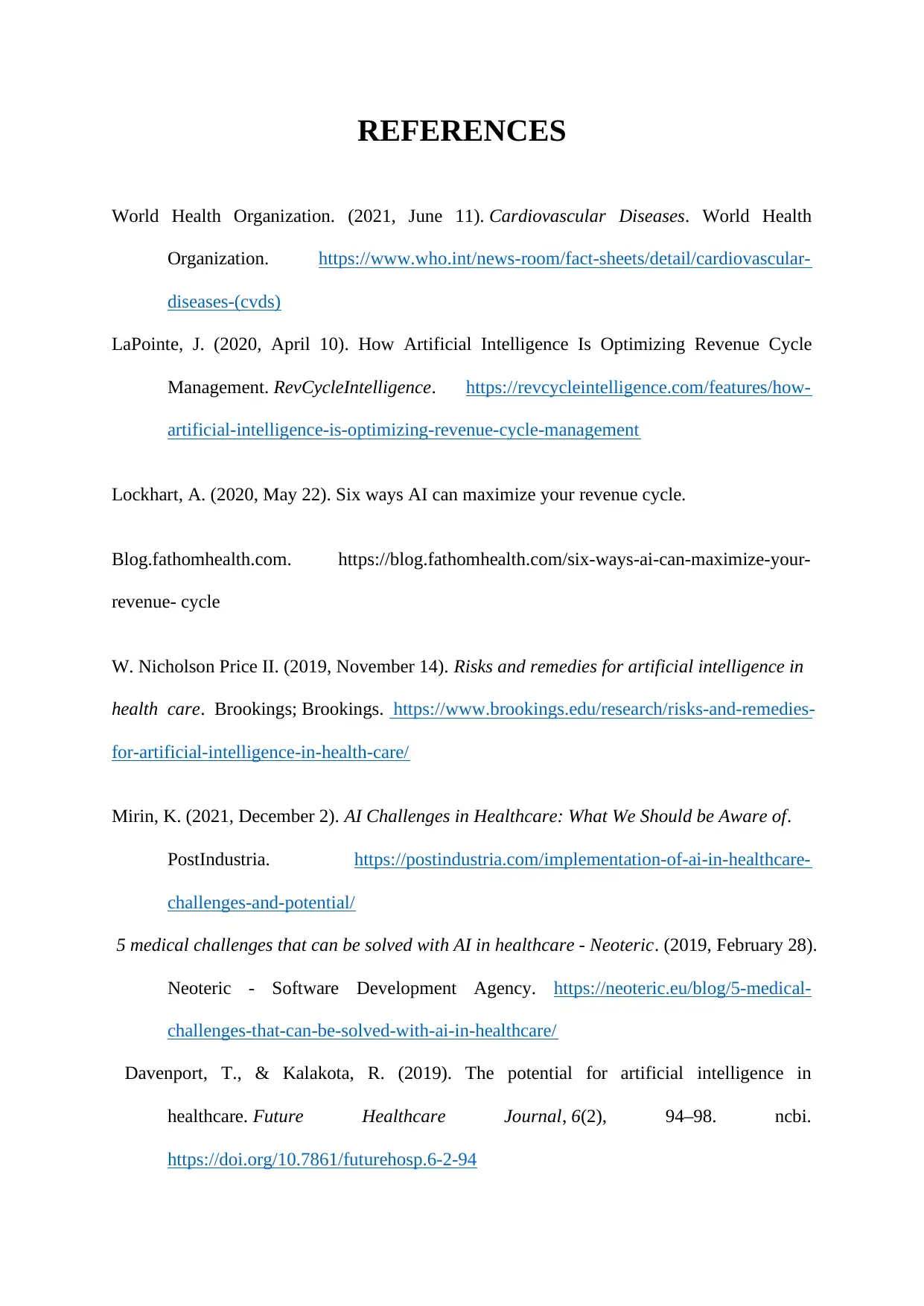
REFERENCES
World Health Organization. (2021, June 11). Cardiovascular Diseases. World Health
Organization. https://www.who.int/news-room/fact-sheets/detail/cardiovascular-
diseases-(cvds)
LaPointe, J. (2020, April 10). How Artificial Intelligence Is Optimizing Revenue Cycle
Management. RevCycleIntelligence. https://revcycleintelligence.com/features/how-
artificial-intelligence-is-optimizing-revenue-cycle-management
Lockhart, A. (2020, May 22). Six ways AI can maximize your revenue cycle.
Blog.fathomhealth.com. https://blog.fathomhealth.com/six-ways-ai-can-maximize-your-
revenue- cycle
W. Nicholson Price II. (2019, November 14). Risks and remedies for artificial intelligence in
health care. Brookings; Brookings. https://www.brookings.edu/research/risks-and-remedies-
for-artificial-intelligence-in-health-care/
Mirin, K. (2021, December 2). AI Challenges in Healthcare: What We Should be Aware of.
PostIndustria. https://postindustria.com/implementation-of-ai-in-healthcare-
challenges-and-potential/
5 medical challenges that can be solved with AI in healthcare - Neoteric. (2019, February 28).
Neoteric - Software Development Agency. https://neoteric.eu/blog/5-medical-
challenges-that-can-be-solved-with-ai-in-healthcare/
Davenport, T., & Kalakota, R. (2019). The potential for artificial intelligence in
healthcare. Future Healthcare Journal, 6(2), 94–98. ncbi.
https://doi.org/10.7861/futurehosp.6-2-94
World Health Organization. (2021, June 11). Cardiovascular Diseases. World Health
Organization. https://www.who.int/news-room/fact-sheets/detail/cardiovascular-
diseases-(cvds)
LaPointe, J. (2020, April 10). How Artificial Intelligence Is Optimizing Revenue Cycle
Management. RevCycleIntelligence. https://revcycleintelligence.com/features/how-
artificial-intelligence-is-optimizing-revenue-cycle-management
Lockhart, A. (2020, May 22). Six ways AI can maximize your revenue cycle.
Blog.fathomhealth.com. https://blog.fathomhealth.com/six-ways-ai-can-maximize-your-
revenue- cycle
W. Nicholson Price II. (2019, November 14). Risks and remedies for artificial intelligence in
health care. Brookings; Brookings. https://www.brookings.edu/research/risks-and-remedies-
for-artificial-intelligence-in-health-care/
Mirin, K. (2021, December 2). AI Challenges in Healthcare: What We Should be Aware of.
PostIndustria. https://postindustria.com/implementation-of-ai-in-healthcare-
challenges-and-potential/
5 medical challenges that can be solved with AI in healthcare - Neoteric. (2019, February 28).
Neoteric - Software Development Agency. https://neoteric.eu/blog/5-medical-
challenges-that-can-be-solved-with-ai-in-healthcare/
Davenport, T., & Kalakota, R. (2019). The potential for artificial intelligence in
healthcare. Future Healthcare Journal, 6(2), 94–98. ncbi.
https://doi.org/10.7861/futurehosp.6-2-94
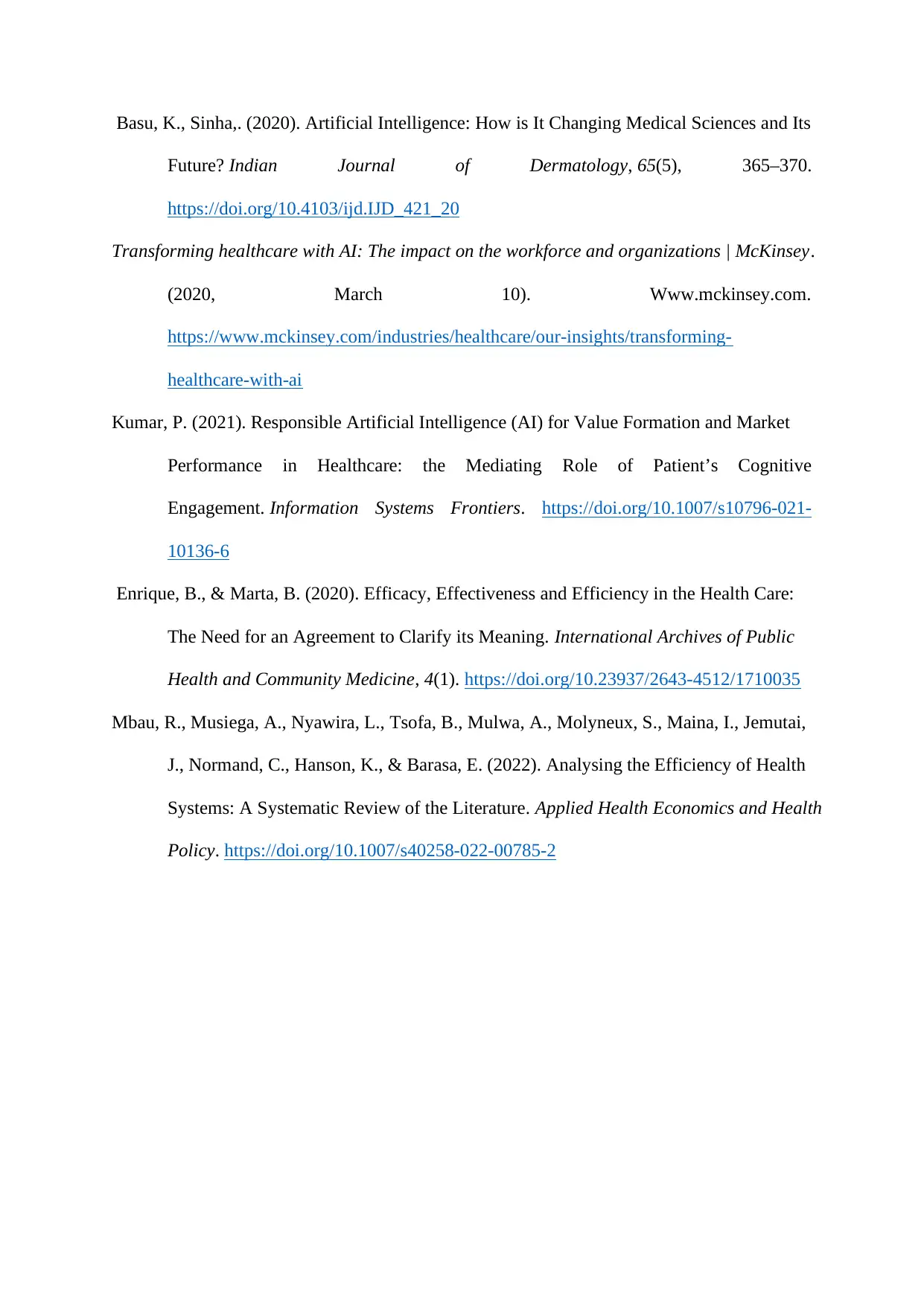
Basu, K., Sinha,. (2020). Artificial Intelligence: How is It Changing Medical Sciences and Its
Future? Indian Journal of Dermatology, 65(5), 365–370.
https://doi.org/10.4103/ijd.IJD_421_20
Transforming healthcare with AI: The impact on the workforce and organizations | McKinsey.
(2020, March 10). Www.mckinsey.com.
https://www.mckinsey.com/industries/healthcare/our-insights/transforming-
healthcare-with-ai
Kumar, P. (2021). Responsible Artificial Intelligence (AI) for Value Formation and Market
Performance in Healthcare: the Mediating Role of Patient’s Cognitive
Engagement. Information Systems Frontiers. https://doi.org/10.1007/s10796-021-
10136-6
Enrique, B., & Marta, B. (2020). Efficacy, Effectiveness and Efficiency in the Health Care:
The Need for an Agreement to Clarify its Meaning. International Archives of Public
Health and Community Medicine, 4(1). https://doi.org/10.23937/2643-4512/1710035
Mbau, R., Musiega, A., Nyawira, L., Tsofa, B., Mulwa, A., Molyneux, S., Maina, I., Jemutai,
J., Normand, C., Hanson, K., & Barasa, E. (2022). Analysing the Efficiency of Health
Systems: A Systematic Review of the Literature. Applied Health Economics and Health
Policy. https://doi.org/10.1007/s40258-022-00785-2
Future? Indian Journal of Dermatology, 65(5), 365–370.
https://doi.org/10.4103/ijd.IJD_421_20
Transforming healthcare with AI: The impact on the workforce and organizations | McKinsey.
(2020, March 10). Www.mckinsey.com.
https://www.mckinsey.com/industries/healthcare/our-insights/transforming-
healthcare-with-ai
Kumar, P. (2021). Responsible Artificial Intelligence (AI) for Value Formation and Market
Performance in Healthcare: the Mediating Role of Patient’s Cognitive
Engagement. Information Systems Frontiers. https://doi.org/10.1007/s10796-021-
10136-6
Enrique, B., & Marta, B. (2020). Efficacy, Effectiveness and Efficiency in the Health Care:
The Need for an Agreement to Clarify its Meaning. International Archives of Public
Health and Community Medicine, 4(1). https://doi.org/10.23937/2643-4512/1710035
Mbau, R., Musiega, A., Nyawira, L., Tsofa, B., Mulwa, A., Molyneux, S., Maina, I., Jemutai,
J., Normand, C., Hanson, K., & Barasa, E. (2022). Analysing the Efficiency of Health
Systems: A Systematic Review of the Literature. Applied Health Economics and Health
Policy. https://doi.org/10.1007/s40258-022-00785-2
⊘ This is a preview!⊘
Do you want full access?
Subscribe today to unlock all pages.

Trusted by 1+ million students worldwide
1 out of 12
Related Documents
Your All-in-One AI-Powered Toolkit for Academic Success.
+13062052269
info@desklib.com
Available 24*7 on WhatsApp / Email
![[object Object]](/_next/static/media/star-bottom.7253800d.svg)
Unlock your academic potential
Copyright © 2020–2026 A2Z Services. All Rights Reserved. Developed and managed by ZUCOL.




